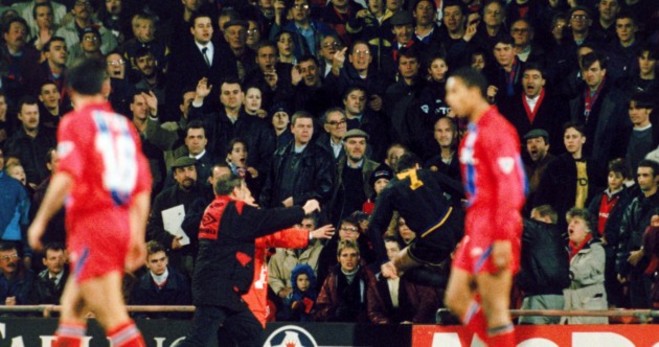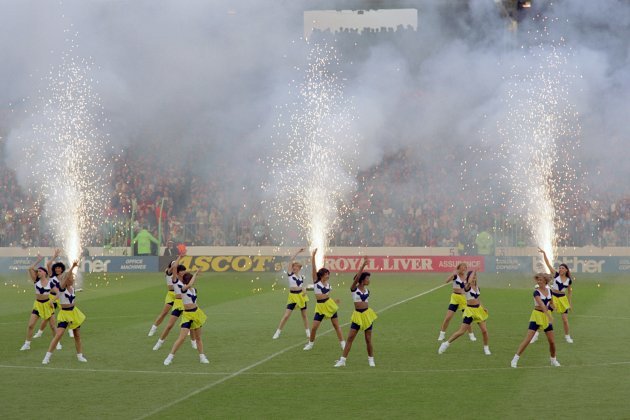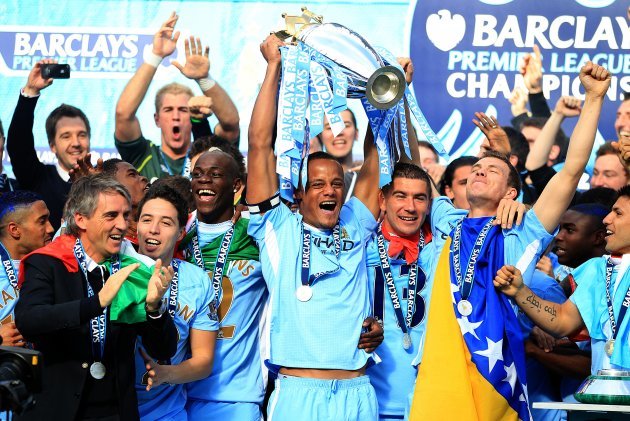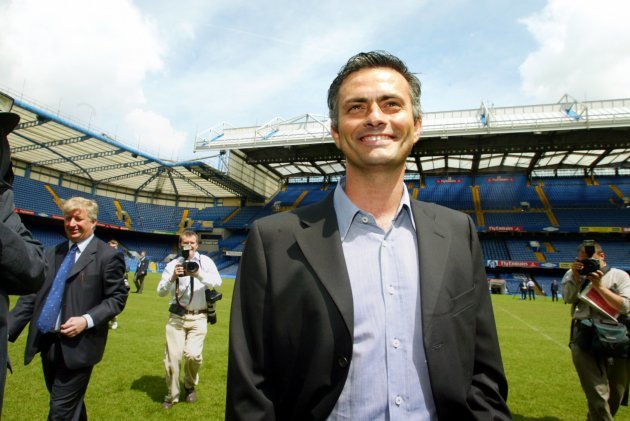IN THE MIDDLE of my interview with Jim White, his mobile rings.
On the phone is Graham Taylor, the former England manager, who the Telegraph journalist has been chasing for an interview.
White (not to be confused with the Sky Sports News presenter of the same name) has arranged an upcoming chat about one of his abiding interests — the England football team, and specifically, their continual lack of achievements on the international stage.
The piece has been planned to coincide with the 20th anniversary of England’s failure to reach the 1994 World Cup and the infamous treatment that Taylor received from the British press as a result.
And looking at the side now, White cannot help but feel a sense of deja vu looming. The current England squad is widely regarded as being the weakest for years, and White is convinced that the primary reason for their failure to produce great players is due to the increasing tendency to accommodate a host of foreigners at every level in English football and in particular, the competition which beguiles and repels him in equal measure — the Premier League.
This season marks 21 years since the league’s inception and the Sky TV-led revolution in the British game. To mark the occasion, White has written a book, whose title is fairly self-explanatory — Premier League: A History in 10 Matches. Through the 10 encounters in question, it explores larger themes and patterns that have proved significant in the English game over the years — one of which, White explains, has been the increasing marginalisation of British and Irish players.
“I think the direction it’s going is increasingly elitist and increasingly international,” he says. “Man City’s youth team recently beat Bayern Munich’s youth team in a friendly, and the match-winning hat-trick was scored by a Portuguese 16-year-old. That is extraordinary — that Manchester City would have a Portuguese 16-year-old playing in their youth team.
“I also think big teams will effectively have B-teams playing in the lower divisions. Tottenham have got four players on loan at Swindon at the moment. They may not be called Barcelona B, as they are in Spain, but ultimately, Tranmere Rovers will be Everton’s feeder team, Oldham will be Man United’s feeder team…
“I think the two new battlegrounds for football is the ‘us and them’ issue of money and the ‘us and them’ issue of international football. The irony is that one of the premises on which the Premier League was built was that it was going to strengthen the international team and self-evidently, it hasn’t, and that’s only going to get worse.
“There’s absolutely no reason why an American who owns Aston Villa is interested in promoting the England international team. He wants his product to be internationally known, promoting what he wants to do internationally. Look at the guy who’s just bought Cardiff City [Vincent Tan] – he’s trying to promote Malaysia in the way that the Man City owners are promoting Abu Dhabi. So on that vehicle, around the world, he can promote Malaysia.”
(Dancers pictured at the launch of Sky TV’s first-ever Premier League game in 1992)
He continues: “So where does developing young Welsh talent fit into that? It’s completely irrelevant. You look at the knock-on effect. If you think England is suffering as a result of young players not coming through, which it is, look at Scotland, Ireland and Wales. Okay, Wales have Gareth Bale and Aaron Ramsey, but they’ve very few great players.
“In the old days, the core of Man United and Liverpool was Scottish. In the last transfer window, only one player transferred between Premier League clubs was Scottish [Barry Bannan]. In the future, the clubs will become much more muscular and the international game, in Britain and Ireland, will wither as a result.
“Joe Hart, for instance, is a very talented player, but he’s having a nightmare. So who else does Roy Hodgson pick? There are only four English-born goalkeepers in the Premier League. The other one who’s any good, Jack Butland, can’t even get in the Stoke team. There just aren’t the players there for him. You see when Wayne Rooney or Jack Wilshere is injured, they’ve got no international class players apart from Ashley Cole. So I think England are going to slip further and further back.”
Nevertheless, White’s views are not shared by an overwhelming majority. Other authorities on the game, including Arsene Wenger, are skeptical about the suggestion that the England side’s struggles can be blamed on the influx of foreign players into the Premier League. They argue that England’s so-called ‘Golden Generation,’ most of whom reached their peak in the mid-00s, is proof that the national team can still thrive.
However, White disagrees with this point: “The ['Golden Generation'] unquestionably underperformed, but if you look at where they came from — that Liverpool team that played Newcastle in that great side were 90% English. Yet Newcastle played the other day without a single Englishman in the team. So where are those opportunities going to come from now?
“We’ve got these incredibly sophisticated academies. They’re like Google’s headquarters — it’s this unbelievable steel and glass wonder place with these amazing grass pitches and facilities and the kids who go there are being taught brilliantly. But then they’ll end up in the Championship. They’re not going to play for Spurs.
“It’s an interesting debate — you look at 2008 when three English teams made the Champions League semi-final and two made it to the final. Now, I very much doubt there’ll be three teams making it past the group stage. Despite the fact that they’re able to recruit the best in the world, I don’t think the Premier League is the best in the world.
“I know it’s the fashionable thing to say, but I think the Bundesliga is a better model and is now producing better teams. But that might be cyclical. Having dissed people for predicting long-term trends, I’m reluctant to say the Premier League won’t come back.”
Moreover, while White finds aspects of the Premier League cynical and unsettling, he also recognises its immense power and capacity to create incredible drama. One of the most recent games which highlighted some of the most enticing elements of the league was Man City’s thrilling 3-2 final-day victory against QPR, which enabled them to win the 2012 Premier League title. And it’s also, unsurprisingly, one of the matches that White takes an in-depth look at.
(Manchester City’s captain Vincent Kompany lifts the Barclays Premier League trophy in 2012 – Mike Egerton/EMPICS Sport)
“It was very interesting, because it was the same season as the London Olympics. And a lot of people were saying with the London Olympics that it was delivering something different from football and football would inevitably sink in its shadow and that the characters involved in the London Olympics were so much more wholesome, et cetera. But just look at the viewing figures. There were more people watching that day than at any single point in the London Olympics apart from the Opening Ceremony.
“It just demonstrated that absolutely nothing delivers more drama than Premier League football. It didn’t happen last year and I think it’s partly the rarity value. It’s probably what some of the marketing people would like — to concoct a drama and create the circumstances where it’s going to be like that every year. But it’s not like that every year, that’s the great thing — it naturally produces those moments. You can’t replicate them.”
And although it’s no surprise that White chooses the aforementioned match as one of the definitive games in the Premier League’s history, his choices aren’t always predictable. For instance, he somewhat controversially decided to omit the classic 4-3 game involving Liverpool and Newcastle in the 1995-96 season.
“They’re not the best matches — the match that everyone reckons was the best was the Newcastle-Liverpool one,” he explains. “I didn’t want it in there, because everyone would expect it to be in there. But then again, I’ve got Man City-QPR, which obviously you’ve got to have in there. But the difference between Liverpool-Newcastle and Man City-QPR was that the latter led to something. Ultimately, Liverpool-Newcastle didn’t mean anything. It didn’t mean anything more than Stoke beating QPR 2-0 two seasons ago. They were two exciting teams, but ultimately, it never went anywhere. So what I wanted was matches that had a wider meaning.
“They didn’t and still haven’t [won the title]. And many a Man United fan is now thinking ‘oh sh*t, are we going to be Liverpool again?’”
In addition, one of the less obvious games that White elects to focus on is the highest-scoring game in the Premier League’s history — Portsmouth’s 7-4 defeat of Reading back in September 2007.
YouTube credit: PhantomFX91
And while the game in itself was extremely entertaining to watch, that is not the primary reason why White chose to devote an entire chapter of his book to it.
“The interesting thing about Portsmouth-Reading was I wanted to do something about Portsmouth. The story of Portsmouth runs against everything we’re told about the Premier League. We’re told that the Premier League is this great money-making machine. Yet here was a club going bust in the middle of it — the only club to go bust.
“So I wanted some way of looking at Porstmouth. And actually, Portsmouth-Reading is really fascinating because nobody could see what was coming. I’ve got some contemporary stuff from a Reading fans’ website where they’re saying ‘why can’t we be more like Portsmouth’. ‘Why can’t we show the same ambition as Portsmouth?’ Not that long after — six years later — Portsmouth are in the bottom division, completely bankrupt, having gone into administration twice. Reading are a yo-yo club but they’re still there, they’ve been back in the Premier League since.
“And that’s the interesting thing about the Premier League — people misread it all the time. People think what’s going on has a meaning. Everybody thought Blackburn would be the great team of the 90s. Right up to the last match in the book — Man City-QPR. I spoke to Gary Neville and he said if he heard that the power has shifted just once in the weeks after, he must have heard it a dozen times. And yet, the next season, United won the title.
“When Jose Mourinho came into Chelsea, he won the league twice. He said things like ‘I’m going to be here for the rest of my life’. And people were writing — ‘Well, nobody else is going to win the league now’. The combination of Roman Abramovich’s money and Jose Mourinho meant people thought Chelsea were going to rule the roost forever.”
And similarly, there is one Premier League misconception that has recurred with particular regularity, as long-term Man United fans know all too well.
“Throughout his career, it was always ‘this is it, Alex Ferguson’s career is all over’. So they’d lose 6-3 at Southampton and people say ‘it’s all over for Ferguson’. But he goes on to win the title. That period where Mourinho came in, he really looked finished. And I wasn’t immune from writing his sporting obituary, I must say. But he recovered from the whole Rock of Gibraltar crisis among other things.
“Even apart from Ferguson, look at how wrong people got it with Arsene Wenger. I was writing, last year, about how disgraceful it was that the Arsenal crowd were chanting ‘you don’t know what you’re doing’ at Arsene Wenger. And I got endless abuse, with people saying ‘you don’t know what you’re talking about, it’s over, he’s got to go’. Idiots like Piers Morgan tweeting that ‘Ramsey must be Wenger’s love child,’ ‘why’s he giving him a contract?’ et cetera et cetera.
“And the trouble with basing your analysis on personality is that the personalities at the top change so frequently now. Ferguson’s gone, so Wenger is the only manager who’s been in longer than about two years in the Premier League. Alan Pardew is the second longest-serving manager and he’s treading on thin ice. So it makes it even more difficult to predict long-term patterns. The only long-term pattern to predict is that it’s going to get wealthier and I, for years, have said the opposite. I’ve said the bubble’s got to burst at some stage.”
(The arrival of Roman Abramovich and Jose Mourinho, pictured above, prompted many commentators to suggest that Alex Ferguson’s days as Man United manager were numbered)
Another significant theme, which White finds especially depressing, is that ultimately, continued success in the Premier League is down to a team’s finances.
“I think what you can do is look at the Premier League wage table,” he says. “The club that spends the most on wages usually wins the title. You sometimes get a club punching above their weight, as Everton are doing, but mostly, the clubs who spend the least are relegated and the clubs who spend the most get in the Champions League. That’s really the only pattern that has been established. I think that’s the thing — to get the elite players, you have to spend the elite money.
“What Tottenham are paying now was elite money five years ago. And you saw it with Arsenal and Mesut Ozil. They knew that they were going to have to pay the elite money and bust their pay structure to get him in.”
Furthermore, White argues that finance, rather than any other apparent weaknesses elsewhere, has been the reason for Arsenal’s failure to win a trophy for several years.
“I think when Wenger first came in, he did terrifically well. When things have altered for him, it was because of money. When Arsenal moved into the new stadium, they stopped spending money on the first team. And Wenger was under the impression that he had a good enough squad to survive that. I think that’s the real difference. I don’t think it’s because of his philosophy. If you look at the philosophy of Barcelona, that is entertainment of the highest order and yet they’ve been tremendously successful.
“The really unpleasant thing studying the Premier League tells you is that money talks. That’s the conclusion you come to, I’m afraid. You’re not going to get Nottingham Forest winning the Premier League as they won the old Division One.”
In addition to the definitive matches, White also lists certain people who “completely transformed” the league, and in particular, highlights Ryan Giggs, Alex Ferguson, Eric Cantona, Gianfranco Zola, David Beckham and Dennis Bergkamp. And the influence of the latter individual, he feels, is often underestimated.
“Bergkamp just brought in that more mature way of operating that had come from the continent and helped destroy the drinking cultures that used to exist. But also, he introduced a way of playing. There’s an interesting anecdote in the book from Bob Wilson talking about the way Bergkamp used to address the other players in training. The way he used to say ‘just give me the ball and it’ll be all alright’. So they learnt so much from him. I think those players have changed the way we think [about the game].”
YouTube credit: things4cheap
Yet for all the brilliance of Bergkamp among others, there are, by contrast, many aspects of the Premier League that are less admirable. Fans and critics have often expressed their disillusionment with the deplorable behaviour which many of the league’s most high-profile figures routinely adhere to.
Accordingly, many people have fallen out of love with the game. Moreover, no given sport is infallible — having been much loved at one stage, the popularity of basketball and boxing, for example, has declined in recent years. Could the Premier League, for all its current power and unprecedented levels of support, ultimately suffer the same fate?
“The romantic in me says that [the people that run it] have to be careful,” White says. “If people don’t feel it’s value for money, they’re not going to go. And there is evidence in some of the lower clubs in the Premier League that they have to be careful with their pricing. I think it’s back to what I was saying about money, that’s probably the most important thing.
“But in terms of a television spectacle, it’s just so brilliantly done. Sky Television make a drama out of everything and it is the most compelling drama in British life. I’ve got a quote from David Milliband, the former foreign secretary, in the book, saying that wherever he went in the world, the Premier League was the first thing people spoke to him about.
“In the past, Britain’s exports were cars, ships and motors but now it’s the Premier League. Milliband’s line was that “it’s our Hollywood”. And that is a very good way of looking at it. And as with Hollywood, people are forever predicting that the studios are going to collapse — saying ‘no one’s going to be going to the cinema, it’ll all be DVDs’. But as long as the product still gets you into the cinema, you’ll go. And I think if you’re writing about the 42nd year of the Premier League, it’ll probably be unrecognisable from today in its strength and reach.”
YouTube credit: teaizformugz
‘Premier League: A History in 10 Matches’ is now available to buy. More details can be found here.




